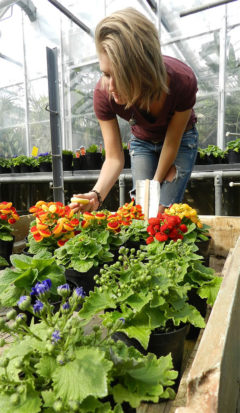Horticulture department to offer fruit, vegetable focus
April 4, 2014
For the last two and a half years the horticulture department at UW-River Falls has been working to get approval for a fruit and vegetable focus within the major; this spring the hard work has paid off.
With the increasing interest from students to grow their own fruits and vegetables and growing locally the new option was created. Brian Smith, professor of horticulture, said that there are a lot of small farms and a fair amount of large farms, but not a lot in between.

There has been a huge push locally, statewide, regionally and nationally to get people to grow their own food or buy locally.
“It’s not just gardening, it’s professional production, and all the factors that belong with that,” Smith said. “The sustainability aspect, the social aspect and the food production aspect; it goes on and on and the jobs in those areas are in demand.”
Horticulture is the technology, science and business that is involved in demanding plant cultivation for human use; it is not just about flowers, trees and shrubs but fruit, vegetables and herbs too.
Smith said that many of the crops we see at the grocery store are coming from overseas. There are many people today that like to see in-house production; if there is not as much control of the food coming in the states from places like Chile and Africa, there is more of a safety issue to chance.
With the 2014 Farm Bill that just came out, there is lots of incentive for small farmers to get involved to growing crops. According to the National Sustainable Agriculture Coalition, NSAC, the new five-year Farm Bill reflects shifting priorities over the past decade in which issues like local and organic food and healthy food access have become elevated in accord with growing consumer demand for agricultural products produced locally and strong growth in the development of local and regional food systems.
“The best return on investment is when you are growing crops locally because you can direct market, and charge a premium price,” Smith said.
The final farm bill builds on the growing investment in local and regional food systems, organic agriculture and healthy food access, providing greater opportunities for small and mid-sized farms, specialty crop farmers and farmers looking to diversify.
While the advances for rural economic development programs are not as great, the farm bill still makes minor improvements to certain programs that serve as starting points for further work in future farm bills.
Furthermore the NSAC website says that in total, the new farm bill will invest $501 million over the next five years directly into the local food, rural development, organic agriculture and healthy food access initiatives that NSAC works on and supports, representing a nearly 50 percent increase over the previous farm bill from 2008.
The new fruit and vegetable sustainable systems option is targeting lots of different facets. The classes give lots of different options to student’s careers. The classes for this focus have always been around and available, the professors of the horticulture department are now just putting them together in a way to advise students to get a formal recognition of the specific focus of fruit and vegetable studies. Smith said they might add more courses in the future, they don’t know just yet.
UWRF is the only UW school that offers this particular area of study. UWRF has enough faculty and core courses and facilities that are close by for the professors and students to take advantage of as well as good growers in the area to use their gardens as a field trip and hands on experience for students.
White Pine Berry Farm is an example of a student who has been through the courses at university and decided to start a local farm to grow and sell to people in the surrounding community.
“You get to know your customers and clientele as well as develop a trust that normally wouldn’t be when you go to the grocery store; you don’t know who grew it or where it came from,” Smith said.
Students who are interested in pursuing the new option can contact the Plant and Earth Science department at 715-425-3345 or stop by room 324 in the Agriculture Science building and ask to talk to any of the horticulture professors for more information.
